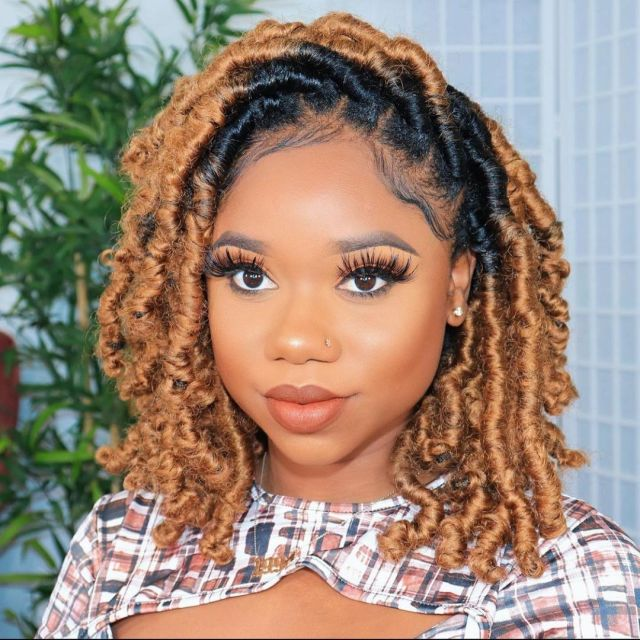Apart from our language and native attire, another thing peculiar about the African culture is our hairstyles. And today, these traditional African hairstyles have gone mainstream.
Women of other races wear them, including your favorite celebrities such as Rihanna, Beyonce, Adele, Khloe, and Kim Kardashian, etc. Furthermore, stylish Nigerian musicians like Yemi Alade have been able to own them well enough, making these coiffures more desirable.

If you plan to give Afrocentric fashion a shot, don’t just settle for African fabrics alone. Ensure you rock any of the traditional African hairstyles. They’ll bolster your African look and present you as the African queen that you are.
Ready to see them? Let’s dive in.
History of Traditional African Hairstyles

Many of the evergreen traditional black hairstyles can be traced to the drawings and hieroglyphics of ancient Egypt.
Back then Egyptians wore headdresses or wigs to symbolize their societal ranks. These headdresses were precious to the ancient Egyptians. And they were often styled with braided pieces of palm fibers, human hair, materials on a thick skullcap, etc. But these wigs were only for prominent people as Egyptian law prohibited slaves from wearing them.
Furthermore, in the 15th century, African hairstyles were mostly used to represent different things such as wealth, fertility, and grief.
For instance, women of royal heritage wore elaborate hairstyles to flaunt their status. And to showcase her fertility, a woman would wear her hair thick, long, and neat.

According to Sylvia Ardyn Boone, an anthropologist who specializes in the Mende culture of Sierre Leone:
“West African communities admire a fine head of long, thick hair on a woman. A woman with long thick hair demonstrates the life force, the multiplying power of profusion, prosperity, a ‘green thumb’ for bountiful farms and many healthy children”
Sylvia Ardyn Boone
Also, Africans of old —and even to date— see their hair as a sacred part of their body. Some believe it aided divine communication while others believed if a single strand got into the hands of an enemy, it would become an ingredient of a diabolical charm that could harm the owner. And this is why many of them entrusted their hairstyling to trusted relatives.
But come to think of it, did they think close relatives couldn’t have harmed them? Well, let’s not ruin the minds of our ancestors.
As we were saying, hairstyling moments were also an opportunity for Africans of old to interact and socialize. That hasn’t changed one bit.

I mean, we still make new friends and crack jokes in the salon, don’t we?
And the beauty of these hairstyles hasn’t changed. They’ve only evolved to look more modern and attractive.
Let’s check them out.
Beautiful Traditional African Hairstyles for the Trendy Black Woman

Wanna rock a gorgeous Afrocentric hairstyle? Check out these traditional African braids. You’ll love your look once you wear any of them.
1. Dread Hairstyles

These traditional hairstyles date back to 2500 BCE with the Dreadlocked Vedic deity Shiva and his followers. Some people keep dreadlocks as a spiritual obligation and they reference Samson in the Bible to back up their claim.

Even though dreadlock hairstyles are associated with Rastafarians and everything Jamaican, it’s a beautiful coiffure you should try. Moreso, it’s an economical and easy-to-maintain protective hairstyle. And you can either lock your natural hair or go for faux locs.

If this is your choice, consult our guide on how to maintain dreadlock hairstyles before going for it.
2. Fulani Braids

This hairstyle stems from the Fulani people of Nigeria. It features a cornrow braided down through the center of your head, other cornrows braided sideways towards your temple, and others wrapped around your hairline.

To furher beautify this style, decorate your hair with hair accessories such as beads or cowries.

3. Bantu Knots

This coiffure originated from the Zulu people of Africa. They’ve evolved from being a traditional hairstyle to an internationally adopted one. As A-list western celebrities have worn this coiffure so have white models for Luxury brand designers graced this hairstyle while strutting on the runway.

This hairstyle is beautiful. And to achieve it, you section your hair into different parts. Afterward, twist and wrap each section to form a spiraled knot on your head that looks like a stack of tyres.

4. African Threading

While thread hairstyles may not be your regular stylish hairdo, it remains an integral part of our heritage and also offers benefits to your hair. This traditional African hairstyle is also a great option if you want to stretch your hair without using a heat styling tool.

You can use any color of rubber thread, wool, or yarn to achieve thread hairstyles. Take a cue from Yemi Alade’s fashion style and see how she does it.

5. Cornrows

Cornrow hairstyles have been a part of the African culture for as long as time exists. Both men and women of old wore cornrows to represent their tribe and status.

And to express their personalities, they adorned their cornrows with beads, glass, shells, twigs, corals, etc.

Of course, these coiffures have evolved to become shuku cornrows, stitch braids, ghana weaving, and many others. Pick your choice from our catalog of cornrow hairstyles and go look beautiful.
6. Amasunzu

The Tutsi and Hutu people of Rwanda own this coiffure. It dates back to over 500 years ago. Warriors of old wore it to symbolize strength and courage while single girls wore it to show they were virgins.

The modern version is beautiful especially as seen on Lupita Nyong’o.

7. Afro

With this hairstyle came the natural hair movement. This hairstyle was popular among our grandparents in the 70s then it made a serious comeback in 2010 when the natural hair movement gained ground as many black women rocked bold Afro everywhere.

It’s a protective hairstyle that can be easily achieved. And if this is your choice, follow our guide on how to achieve afro hairstyles.

8. Zulu Topknot

As you can see from the name, this hairstyle originates from the Zulu people of Africa. Back then, only high-class women wore these traditional African hairstyles to signify their social status.

Now it’s penetrated into other African cultures such as Somali, Ethiopia, and others. And any woman can rock it regardless of her social status.

9. Ngala

This hairstyle is peculiar to the Igbo people of Nigeria. Nowadays, it’s a common wedding hairstyle for Igbo brides. It looks great when paired with their traditional wedding dress.


10. Edamburu

This traditional African hairstyle originated from the Mangbetu people of Africa. They wear this coiffure to appreciate the culture of skull elongation which symbolizes prestige and beauty to the Mangbetu people.

To achieve Edamburu, you twist or weave your hair into a crown.

And that’s a wrap for the traditional African hairstyles. Which of them would you like to rock in a modern way? Before you make your choice, don’t forget to adorn them with the right accessories.

Wanna see the ones we recommend for you? `Not a problem. Check out our piece on hair accessories right away.






